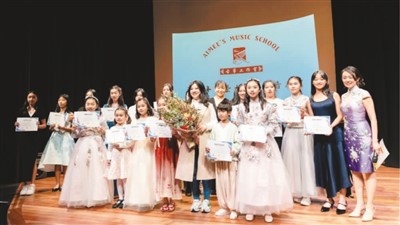Chinese woman promotes guzheng culture in Sydney
From:People's Daily OnlineAuthor: 2023-11-16 16:42

Zhou Yunan (third from right, front row) and others pose for a photo to celebrate the 5th anniversary of a guzheng studio in Sydney, Australia, in 2022. (Photo courtesy of the interviewee)
The guzheng, also known as the Chinese zither, is a musical instrument that beautifully represents Chinese culture. In Sydney, Australia, Zhou Yunan founded a guzheng school with the aim of promoting the art of guzheng and allowing more people to experience the charm of traditional Chinese music.
Zhou was born into a musical family, with her grandfather, mother, and uncle all involved in music education. Growing up in such an environment, she developed a love for the guzheng.
After obtaining a master's degree in guzheng from the Shenyang Conservatory of Music in Shenyang, northeast China's Liaoning Province, Zhou immigrated to Australia with her family. The strong sense of nostalgia made her love for the guzheng even stronger.
Zhou said that foreigners, despite their limited exposure to traditional Chinese instruments, are consistently amazed by the captivating and enchanting sound of the guzheng when they get a chance to listen to it being played.
Zhou noticed that many overseas Chinese are eager to expose their children to Chinese musical instruments and traditional culture, but they often lack the opportunities to do so. This motivated her to take on the responsibility and obligation to promote guzheng culture.
In 2017, Zhou founded a guzheng school in Sydney.
"It's not easy to promote traditional Chinese musical instruments overseas. On one hand, there is a shortage of professional guzheng teachers or teachers for other Chinese musical instruments," Zhou said. "On the other, the guzheng is not a mainstream instrument in Sydney, so establishing the school's reputation was also a challenge."
During that period when we-media was not as advanced, the school primarily relied on engaging in various activities for promotional purposes, including Chinese New Year concerts, community events, and performances staged by the school's students. Through word of mouth, the school gradually gained recognition.
Zhou focused on the irresistible allure of the guzheng itself, stating that their main objective was to bring it to the attention of the public.
The guzheng is gradually reaching more people, Zhou said, noting that while the majority of students are overseas Chinese, there has been an increasing proportion of students from other countries, such as Australia, South Korea, Indonesia, Malaysia and Vietnam.
Zhou is delighted to see that many of her students are opting for the guzheng when applying for scholarships, and even selecting the guzheng as a music exam subject for the college entrance examination.
"I aspire to nurture my students effectively and promote traditional music culture in a standardized and professional manner," Zhou said. She frequently collaborates with tea art and dance teachers in Sydney to arrange art exhibitions and photography events showcasing participants dressed in ancient-style clothing, providing students with ample opportunities to immerse themselves in diverse Chinese culture. "Despite our varied areas of expertise, we frequently convene to explore ways to enhance the promotion of Chinese culture," she said.
"In my view, the guzheng is more than just a musical instrument; it serves as a bridge that connects overseas Chinese with their homeland, allowing performers to convey their longing for home to the audience," Zhou said.
"For overseas Chinese listeners, the sound of the guzheng at traditional Chinese festivals evokes a distinct emotion. Music has the power to touch the soul. The guzheng not only showcases the enchantment of traditional instruments but also reflects our cultural confidence and patriotic sentiments," she added.
In recent years, an increasing number of overseas Chinese have actively participated in promoting traditional Chinese culture, sparking a surge in Chinese style and trends in Sydney.
Edit:董丽娜
The copyright of the article and the picture belongs to the original author. If there is any infringement, please contact to delete it